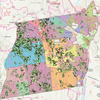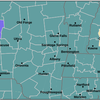Few vote in fire-district elections as volunteers carry on
ALBANY COUNTY — Although millions of dollars are spent every year by taxpayers through their fire districts in the western half of Albany County, just hundreds of the tens-of-thousands of the eligible voters turned out for the commissioner elections on Tuesday.
Commissioners for fire districts across New York State are elected on the second Tuesday in November and, although state law requires prior notification, very few New Yorkers — most frequently just fire-company members — vote.
In the Hilltowns, voter turnout on Dec. 11 for the Berne Fire District, which serves both the Berne and East Berne volunteer companies, was unusually high as the town’s Republican Party chairman drummed up support for a former GOP candidate for town clerk and Berne supervisor.
In the town of Guilderland, which has a population close to 36,000, voter turnout was low in all five fire districts, totalling fewer than 200 votes.
Elections in three of the districts — Westmere, McKownville, and Guilderland Center — were uncontested, and two — Fort Hunter and Guilderland — had two candidates each. Parts of other fire districts, on the edges of Guilderland, also serve the town.
Fire districts are separate political subdivisions that have the ability levy taxes and incur debt without approval from any other governmental entity. The elected commissioners who run the districts are unpaid; they need not be members of the volunteer fire companies.
Each district has five commissioners who serve for five years each. The terms are staggered, so that, barring resignations, only one seat becomes open each year. A district’s board of commissioners creates the district’s budget, scheduling a public hearing to present the budget to the public and seek input, but, as one commissioner told The Enterprise, “It’s not widely attended.”
The board of commissioners then submits the fire-district budget to the town, for inclusion in its budget; the fire-district budgets are not voted on separately, but only as part of the overall town budget.
In the Enterprise coverage area — Guilderland, New Scotland, and the Hilltowns — the Westmere Fire District in the town of Guilderland has the largest budget, since it is paying off a bond on its new firehouse, and will levy a tax of $1.4 million. The next-largest is Fort Hunter, with a 2019 tax levy of $942,643.
The fire departments in the villages of Altamont and Voorheesville are funded by each municipality and administered by the respective boards of trustees.
In New Scotland, which is served by the New Salem and Onesquethaw fire departments, the town has Fire Protection Districts as opposed to fire districts. A fire protection district is an administrative area in a town rather than a separate local entity, so has no commissioner elections.
Similarly, in Rensselaerville, the three fire departments — the Rensselaerville Fire Department, Medusa Volunteer Fire Company, and Tri-Village Volunteer Fire Company — all operate under a fire protection district. Also, the volunteer fire company in Westerlo operates under a fire protection district.
Berne
In Berne — a town with a population of about 3,000 — over 150 people voted to fill two commissioner posts: one for a full five-year term and the other to fill out one year for a deceased commissioner.
William Keal, who was on the ballot, was elected to a five-year position as one of five commissioners with 96 out of 163 votes. David Chase, who was not on the ballot, won a one-year position as a commissioner, garnering 135 out of 150 write-in votes, according to fire district spokeswoman Mary Alice Molgard.
Turnout overall was higher than normal, she said, with usually around 100 people voting. She believes this was in part due to Randy Bashwinger, who serves as Berne’s highway superintendent and GOP chairman, drumming up support for Keal and reaching out to people who normally don’t vote.
Keal has run unsuccessfully on the GOP line for town supervisor and most recently for town clerk.
Chase will be finishing a term held previously by Phyllis Johnson, who died last November. He had also been elected to a one-year position last year to fill out the rest of a term held by commissioner Richard Guilz Sr. after he died, said Molgard.
Keal is not a member of either the Berne or East Berne departments, and has not served as a commissioner before.
“This is my way of volunteering for the department,” he said. “I am not a hook-and-ladder guy.”
He said the position will entail dealing with purchases as well as possibly either upgrading or replacing the East Berne firehouse, and said that his experience in management and administration will serve him well in those situations. Keal also said more information needs to be publicized on budgetary items in the fire department for the public to be informed about them.
In the town of Berne’s 2019 budget, the Berne Fire District has appropriated $364,434.
Keal has lived in the town of Berne for about 10 years, and currently works as a real-estate agent for the firm Howard Hanna.
Justin Crosier received 59 write-in votes for the five-year term as commissioner, while David Chase received five, Eric Gardner received two, and Dave Harnett received one. Mark Rosnick got seven votes for the one-year term as commissioner, while Crosier received three; Gardner received two; and Keal, Peter Becker, and Randy Bashwinger each received one vote.
“A couple of people voted on the wrong line, noted Molgard.
There are also 20 uncounted write-in votes, said Molgard, but she said that these votes are not enough to upset Keal’s and Chase’s victories.
The Berne Fire District will also have a special election on Jan. 8 to vote on whether or not to create capital investment accounts to upgrade the East Berne firehouse and to have an account for equipment.
Knox
Robert Deitz was re-elected to another five-year term in the Knox Fire District, said Frank Fuss, the district secretary.
“Mr. Deitz was re-elected by a 13-to-nothing landslide,” he quipped. He added that turnout was low compared to previous years, when there are usually around 20 to 30 voters.
In the town of Knox’s 2019 budget, the Knox Fire District has $288,000 appropriated.
Deitz, 68, was first elected as a commissioner around 30 years ago after being encouraged to run because, Deitz said, they wanted someone who was not a member of the fire department to be a part of the board.
“It’s been good,” he said. “It’s been a lot of work at times.”
Deitz said he has also served as the chairman of the board for at least 10 years now. The election for chairman will be at the board’s meeting on Jan. 8.
“It’s a job I don’t mind doing,” he said. “If the other committee members decide, I would take it if nominated.”
Westmere
In the Westmere fire district, Mike Pickel (pronounced “Pike-el”) was uncontested in his first run for commissioner and got 41 votes, which he says he was told was one of the largest turnout in 13 years. The Guilderland hamlet of Westmere has a population of 7,284, according to the most recent federal census in 2010.
Westmere’s budget appropriations total $1.89 million, according to the 2019 town budget. Revenues are estimated at just over $21,000, and the district will take $431,000 from reserves, leaving a total of $1.44 to come from taxpayers for 2019.
Pickel has been a lieutenant with the West Crescent Fire Department in Clifton Park for about six years prior to coming to Westmere, where he has also been about six years, he said.
Pickel, 38, said one of his goals is to bring some fresh ideas that will allow all voices in the department to be heard, “just about little minor things.” He said that he is not trying to reinvent the wheel and that everyone in the department does a great job.
Pickel said that, when one of the more senior commissioners decided this year not to run again, other firefighters and commissioners decided it might be good “to get some new blood in there.” With those firefighters and commissioners, he said, he discussed a number of policies “little minor things” — that might need updating.
For instance, he said, there has long been talk of holding the social night in the summer at the firehouse outside, with a fire ring, where people can stop by and chat casually, rather than always holding it indoors, in the members’ room.
At Westmere, Pickel is also a safety officer. This means, he said, that at a structure fire he is the one to make sure firefighters have proper personal protection equipment and to keep an eye on the integrity of the structure to ensure it is still safe for firefighters and that there is no risk of a building collapsing or firefighters becoming trapped.
Pickel works managing a branch of Colony Hardware, he said.
McKownville
Dennis Mason was re-elected as commissioner in McKownville, which has a budget of $462,600. He received 20 votes in the uncontested election. He has served as a commissioner for a year, filling out someone else’s term.
When asked earlier this week why he was running, Mason quipped, “Wish I could say it’s the money.”
He said he has been a firefighter for about eight years, and that he joined “very late in life, at 53.”
He told the story of how he came to join at that age, which started with his own home being destroyed in a fire. He and his wife had owned a shotgun house in Albany, which they had completely remodeled. It was destroyed when sparks from a neighbor’s firecracker landed on a nearby garage, spread to another garage, and then to his back porch.
They wanted to find a brick home, he said, within 50 feet of a fire hydrant.
The home they chose was directly across from the McKownville fire house. “I can hit the station with a snowball,” he said.
He went over to the firehouse and hung out a few times and soon joined the department.
He says that he is still working as an active firefighter, but he normally serves as a driver/operator. McKownville has a very young department, with many members who are university students and that, unless needed, he is comfortable with handing over the reins to them.
“I never saw a more polite, eager group in my life,” he said of the younger members, who he said often hang out at the firehouse, waiting for calls and helping out.
“I live across the street and sometimes the truck is already leaving before I can get there,” he said.
Mason said the work of a commissioner involves making sure the trucks are well maintained and supplied, and making sure the station has everything it needs, from uniforms to tools.
“Right now we are looking at bidding out a new truck, and looking at a new building,” he said.
Another of the commissioners, Jim White, he said, has been working with engineers and contractors, getting the fire district ready to go out to bid again on a $3-million firehouse renovation-and-expansion project. McKownville has been working, he said, to cut costs on the one hand and also better equip itself to bid smartly. He said that, this time, “We know what to ask for, so we can compare apples to apples.
“We’ve got a bond already and, if that is not enough, we’ll have to go back out to voters again,” Mason said.
Mason said turnout for the vote is “usually pretty low. Very few residents come in.”
Mason works in the town of Guilderland’s building department.
Guilderland
Greg Wilhelm won the contest in Guilderland Fire District against Larry Carpenter. Wilhelm said Wednesday that the vote result was 26 to 4.
Wilhelm, who is 32, has been a firefighter for half his life. He grew up in Westmere but joined the fire department in the Guilderland hamlet, a few miles west of Westmere along Route 20, where the minimum age is 16.
He was the first in his family to join, although his father soon followed him. Wilhelm said his father always had to drive him to fire calls and said at one point, “I might as well join too, since I’m there all the time anyway.”
Wilhelm has been a commissioner for three years, serving out the remainder of someone else’s term.
He hopes, as commissioner to help support the long-term success of the fire department.
He said, “I kind of like the business side of the district — there’s so many different aspects. It’s challenging and fun at the same time.” He said that he wears a lot of hats as a commissioner. “My first year, we were designing a fire truck and at the same time had a plumbing issue that we were trying to figure out.”
Wilhelm is a mechanical designer for an engineering firm.
There are a number of new safety mandates coming soon that the fire department will need to respond to, Wilhelm said. “It’s important to have long-term planning, to start saving money to pay for those,” he said.
He noted that the air packs Guilderland uses are getting old. The department is setting aside money for an air-pack upgrade, he said, explaining that these packs hold compressed air — “just like the air you and I breathe, compressed into cylinders that we wear into buildings.” He said he thought the current ones were 14 years old.
“Technology gets better and allows us to work more efficiently,” he said. He said he thought the air packs were due to be replaced in three years, so this year the department would set aside some money now “so we can be in a good position.”
He said that the department just purchased new radios this year that were necessary for safety.
Fort Hunter
Robert Pagnotti and William Fleming ran against each other for one commissioner’s post in the Fort Hunter Fire District. Fleming won with 36 votes; Pagnotti got 17 votes.
Fleming, 54, has been in the fire service for 34 years, most of it with the Fort Hunter Fire Department. This will be his first time as commissioner.
At age 15, Fleming started as a junior firefighter in New Jersey to “learn how to do things and have a mentor.” He became a full-fledged firefighter at 16.
He later joined the Midway Fire Department in Colonie, and then took a couple of years off before joining Fort Hunter, where he has served for about 20 years. Fleming has been an officer for about 19 of those years, working his way up to chief, a position he stepped down from a year ago.
“I have a passion still for the fire service, and it’s one of those goals of wanting to be a firefighter since I was a kid,” he said. Becoming a fire-district commissioner is the next step after being chief, he said.
Fort Hunter’s budget is $1,050,000. Estimated revenues of $107,600 bring that number down to about $940,000.
Guilderland Center
Robert Purzycki, 69, was uncontested in his run to be a commissioner in the Guilderland center district, which has a 2019 budget of $644,978.
Purzycki said that he has been a firefighter for 38 or 39 years and that this is his third term as commissioner. He gave his reason for running again as being “for the taxpayers.” He said he represents the taxpayers and that his goal is “to save the taxpayers all the money we can, and to protect the rules and regulations of the fire department and the fire district.”
Purzycki is retired from 32 years at the mechanic shop of the Guilderland school district, he said.
— Sean Mulkerrin contributed information on News Scotland, Altamont, and Voorheesville fire companies.



